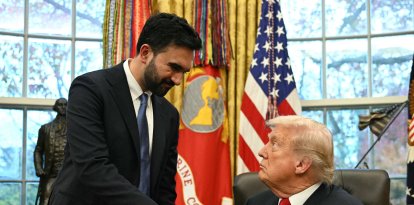Ten states where the Senate majority is at stake
Several Republican candidates have a slim lead in battleground states, but both parties have a path to control the Senate.

(Gage SkidmoreSeguir-Flickr
Current projections point to the Democrats retaining the majority in the Senate. But the margin is so narrow that the outcome remains highly uncertain. FiveThirtyEight gives the Democrats a 70% chance of controlling the Senate. Despite this projection, the most probable scenario is that each party will retain 50 senators, in which case it would be the vote of Vice President Kamala Harris that decides Senatorial control. Inside Elections predicts the same situation: an even split in the number of senators from each party.
Many Senate elections have a clear projected winner. But ten electoral contests can swing the outcome to one side or the other:
Pennsylvania
Pat Toomey (R-PA) is not seeking re-election, so his seat is being contested by Mehmet Oz (R) and John Fetterman (D). Fetterman has the early advantage, as most voters are Democrats and Oz has had a hard time connecting with his base. Fetterman has attacked him in speeches for living in New Jersey up until shortly before he ran for Senate. And Fetterman maintains a lead in the polls.
However, since Fetterman had a stroke earlier this year, doubts have been mounting about his health and, ultimately, his ability to serve as senator. Cook Report says the Democrat has a lead, and 538 puts the figure at 8.9 points, but Real Clear Politics (RCP) projects only a four point margin.
Colorado
Incumbent candidate Michael Bennet (D) has been in office for twelve years. The state consistently votes Democrat, and Bennet holds an advantage over Republican challenger Joe O'Dea. But this advantage is not yet definitive: 538 projects a 9.1 point margin, and RCP projects 8.6. O'Dea has a moderate political position within the Republican Party, which makes him a competitive candidate in the state. Cook and Inside Elections also predict a slight advantage for the Democrats.
New Hampshire
The state of New Hampshire is mostly Democratic, though the state is headed by Republican Governor Chris Sununu. Nonetheless, with the voter base, it will be difficult to challenge Maggie Hassan (D) for the state senate seat. Don Bolduc, the Trump-endorsed Republican candidate, has a very conservative platform, probably too conservative for New Hampshire voters.
This race will be a good litmus test of a highly conservative candidate's ability to win a contested election. Cook and Inside Election both give a slight edge to Hassan. 538 projects a 7.3 point advantage for the Democrat, and RCP an advantage of 8.0 points.
Arizona
In the above cases the Republican candidates have only a slim chance of victory. In Arizona, Blake Masters (R) is a closer to taking the Senate seat from Mark Kelly (D). Joe Biden won Arizona by 0.3 points in the 2020 presidential election, but Masters has tried to take advantage of Biden's unpopularity to wear down his opponent. Despite his connection with the far-right, Masters has yet to prove he can connect with independents and moderate Republicans.
Blake Masters has been supported by Donald Trump, and he is in favor of the law proposed by Senator Lindsey Graham that would ban abortion from the 15th week of pregnancy. Cook projects a slight advantage for the Democrats along with Inside Elections. 538 forecasts a 7.5 point margin between Kelly and Masters, though RCP has downgraded its projection of Kelly's lead to 6.0.
Georgia
There are several states where polls predict a very close result, and Georgia is one of them. Raphael Warnock (D) fights to keep his Senate seat against Herschel Walker (R). Georgia's electorate is majority Republican, but Walker, a retired NFL player, has gaffed on several occasions during the campaign, which has hurt his candidacy.
Despite Walker's errors, it is Warnock who has done the most damage to himself. He has run an extremely progressive campaign, and it will not be easy for him to win in Georgia with such a platform. Inside Elections and Cook say it's an even race. RCP projects a lead of only 0.3 points to Warnock, while 538 has the margin at 2.0 points. In any case, the race will be very tightly contested.
Nevada
The Silver State is a clear example of a swing state. Abortion is one of the issues that has marked the differences between Democratic incumbent candidate Catherine Cortez Masto and Republican Adam Laxat.
Moreover, in this case, there is a polarizing difference between a far-left candidate and one who is very conservative. Laxat is trying to win the working class vote by insisting on the need to control inflation so that it does not undermine wages.
Both Inside Elections and Cook note that it is a tight race. RCP gives a small lead to Laxat (1.7 points) and 538 a slight lead to Cortez Masto (0.7).
Wisconsin
Ron Johnson (R) hopes to renew his Senate seat in this Nov. 8 election, but he does not have it easy. In recent months, Democrat Mandela Barnes, Lieutenant Governor, has been creeping up in the polls, but Johnson has recently regained the advantage. The two candidates have accused each other of being extreme in a state without a clear majority of either party.
Cook projects a nearly even race, but Inside Elections says Johnson has a slight edge. The 538 polling average shows a tie, but the RCP poll gives Johnson a small 1.5-point lead.
Florida
Marco Rubio is having a very difficult time securing re-election, at a time when Florida's registered Republican voters clearly outnumber the Democrats and popular Governor Ron DeSantis is all but assured of re-election.
While Rubio does not necessarily charm voters, this will likely not cost him the election. Rubio has proven to be a senator who proposes measures that end up being approved, such as increasing public spending on health care for veterans. He has the support of the Hispanic community.
Cook says Rubio has an advantage, which Inside Elections believes is clear though not definitive. RCP projects only a 2.8 point margin over Democratic candidate Val Dennings, while 538 raises gives Rubio a 3.8 point cushion.
North Carolina
Ted Budd is a conservative candidate and owner of a gun store, which should not be a problem in North Carolina. The Democrats have chosen Cheri Beasley, a staunch supporter of abortion rights, who otherwise presents herself as a moderate.
Both Cook and Inside Elections believe the election will favor Budd. RCP projects an advantage of two points for the Republican and 538 only 0.3.
Ohio
The Ohio election will prove to be especially interesting. The Republican candidate is J.D. Vance, an investor and author of the memoir Hillbilly Elegy, which should help him build a connection to the working class. However, his adversary, moderate Democrat Tim Ryan, has adopted a message that is close to that of today's Republicans or that of Democrats many years ago: he wants Ohio to regain the industrial jobs it has lost in recent decades.
Inside Elections and Cook predict a Republican victory, but the polls do not give Vance a very clear lead. RCP estimates his lead over Ryan to be 1.2 points, while 538's projection is only a 0.2 point margin in favor of the Republican.

























